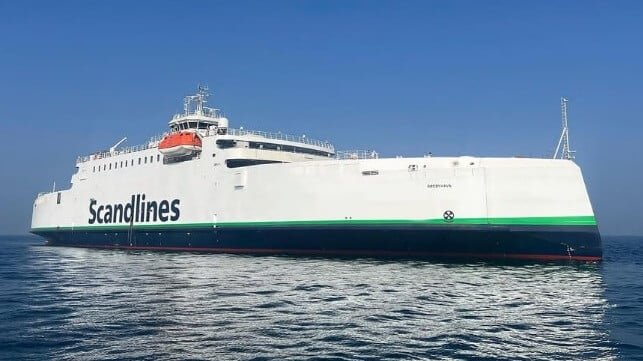Denmark’s Scandlines Anticipates Arrival of Zero-Emission Ferry
Denmark’s Scandlines is eagerly awaiting the delivery of its newest ferry, currently undergoing trials and certification in Turkey. This hybrid-electric vessel, set to enter service later this year, will mark a significant milestone for the line as its first fully zero-emission capable ship.
The vessel, known by its hull number 1090 and code name Futura, is equipped with a powerful 10 MW battery capacity. This enables it to complete the journey between Rodbyhaven in Denmark and Puttgarden in Germany in approximately one hour in zero-emissions mode at a speed of 10 knots, or 45 minutes in hybrid mode at speeds of up to 16 knots. Furthermore, shore charging capabilities will be introduced this fall, allowing for a quick 12-minute recharge of the battery system.
Rendering of the new ferry which will be capable of running on batteries in a zero-emission mode (LMG Marin)
Designed by LMG Marin, the ferry was built with the future in mind, as it is ready for potential upgrades to methanol propulsion. Despite its environmentally friendly focus, the vessel is also impressively spacious, being 23 percent larger than the four Scandlines ferries currently operating on the same route. With a length of 485 feet (147 meters), it can accommodate 66 freight units (1200 lane meters) and up to 140 passengers.
The vessel’s modular design by Marin allows for easy conversion to carry cars, in addition to its primary function as a double-ended Ro-Ro ferry capable of transporting trucks on both its upper and lower decks.
Kongsberg, the renowned maritime technology provider, announced that the ferry will feature its azimuth thruster Azipull. This thruster, equipped with controllable pitch propellers and an integrated permanent magnet drive motor in an L-drive configuration, is expected to enhance energy efficiency while reducing noise and vibrations.
Construction of the ferry took place at the Cemre Shipyard in Yalova, Turkey, with trials commencing in March. Scandlines recently completed equipment and auxiliary systems tests, as well as a heeling test, at the equipment berth. The vessel has successfully passed its Sea Acceptance Tests and is currently undergoing comprehensive testing of all systems and equipment in collaboration with the shipyard, Lloyd’s Register, and the Danish Maritime Authority.
Upon completion of the handover process, the ferry will set sail for Denmark, with planned stops in Gibraltar and Brest, France, before arriving at Rodbyhavn. Following an official naming ceremony, the ferry will be deployed on the Fehmarnbelt route, a vital link between Denmark and Germany.
This vessel represents the latest innovative ship from Cemre, following the delivery of a large fully electric ferry to Norway in mid-April. With its cutting-edge technology and commitment to sustainability, the new Scandlines ferry is poised to revolutionize maritime transport in the region.

